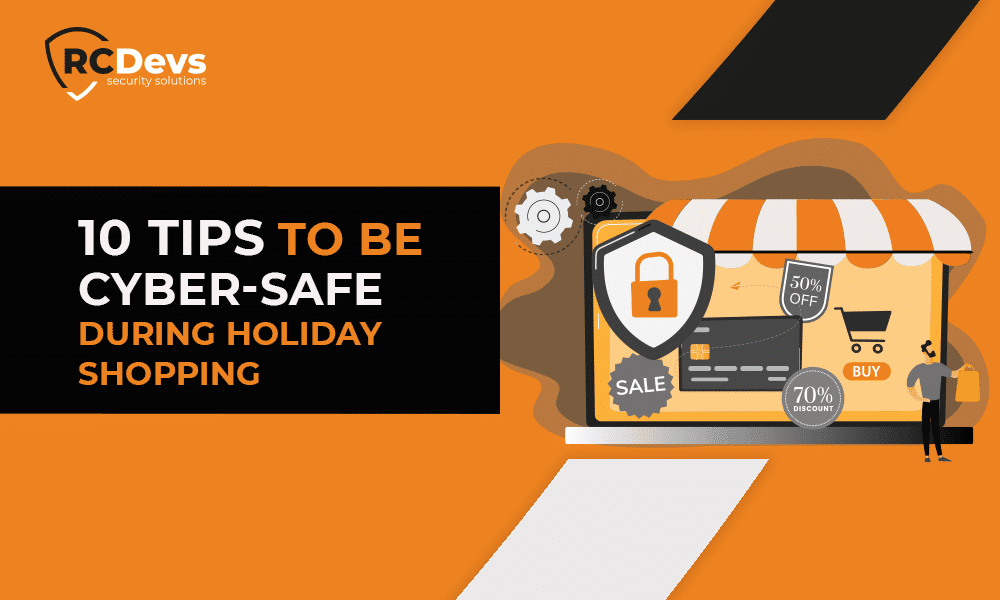
10 Tips to be Cyber-Safe during Holiday Shopping
10 Tips to be Cyber-Safe during Holiday Shopping
There were 148 million records breached in December 2020. With the holiday season upon us, the number of online shoppers increases immensely, with cybercriminals following suit to target their next victims. Unfortunately for holiday shoppers, attackers take advantage of the increased online transactions, emails, and financial activity. The more buyers use their credit cards and payment methods, the more chances arise for consumer data theft.
It is essential to remain vigilant and watch out for other types of holiday cybersecurity threats. This article will expand on the most common online scams and 10 helpful tips to be cyber-safe during holiday shopping.
Common Holiday Scams
During the holidays there are environmental circumstances that could further expose internet users to the risk of cybercrime. The 3 most common holiday scams are:
1) Holiday Phishing
During this time, the number of malicious emails that contain malware as a link or attachment shoots up. Social Media and mobile platforms are the hotspots for phishing messages. It contains special offers, taking advantage of the holiday period that’s marked by a spike in online shopping.
2) Smishing Messages
With internet users placing high orders during the holidays and likely waiting for shipping notifications is high too. Cybercriminals use it to send out fake messages to update customers on the status of their shipments. Usually, these messages include a malicious link or carry malware. That’s why this scheme of attack is very efficient, especially during the holidays.
3) Distributed Denial of Service (DDoS) attack
A distributed denial-of-service (DDoS) attack is an attack in which multiple compromised computer systems attack a target, such as a server, website, or other network resources, and cause a denial of service for users of the targeted resource. The flood of incoming messages, connection requests, or malformed packets to the target system forces it to slow down or even crash and shut down, thereby denying service to legitimate users or systems.
10 Tips to be Cyber-Safe during Holiday Shopping :
Recovering from a cyberattack is never easy, but preventing online scams is a more viable approach.
1) Add Extra Security to Your Email Accounts
Email attachments are one of the popular attack paths as discussed above. Protect your account by using Multi-Factor Authentication. Give your important accounts extra security with two or more authentication factors to log into your account.
2) Bank Statements
Check your bank statements and be careful when using debit cards. Be extra diligent when checking your bank and credit card statements. Report any foreign transactions promptly.
3) Use Official App Store
Don’t download apps for your mobile device from unrecognized sources. Always use official app stores such as the Apple App Store, Google Play, and the Amazon App Store. Malicious apps could serve malware, and could be used by cybercriminals to extract sensitive data, bank accounts details, and hinder your holiday shopping.
4) Do not use public Wi-Fi for any shopping activity
Public Wi-Fi networks can be very dangerous, especially during the holiday season. While they are very convenient, they are not secure, and can potentially grant hackers access to your usernames, passwords, texts, and emails. While it is best to avoid public Wi-Fi altogether, if you need to utilize a public network, ensure that you never establish an autoconnection and that you are logged out of all personal accounts, such as your banking sites.
5) Go directly to the source
Be skeptical of emails or texts claiming to be from companies or charities with peculiar asks or messages. Instead of clicking on a link within the email or text message, it’s best to go straight to the company’s website or contact customer service.
6) Check Link Preview
Hover over links to verify the URL. If someone sends you an email with a link, hover over the link without actually clicking on it. This will allow you to see a link preview. If the URL looks suspicious, don’t interact with it and delete the email altogether.
7) Data Back-Up
Preserve your data by backing it up regularly on your computers and phone.
8) Change your Credentials
As mentioned, your personal and financial information may be harvested, including your website usernames and passwords. So, you may want to change your credentials to help ensure that your online accounts haven’t been compromised. It is a mistake to use the same username and password for each online account, as the cybercriminals will only need the details for one account to access them all. Create a strong password by using a combination of upper and lowercase letters, numbers, and special characters.
9) Use retailers with secured websites
Secure websites are websites protected by a security certificate which is a digital stamp of approval from an industry-trusted third party known as a certificate authority (CA). The website will display a closed padlock in the status bar, and the URL will begin with “HTTPS”, indicating that the webpage uses the SSL or TLS protocol, a data transfer security standard that encrypts data and authenticates the server and the integrity of the message.
10) Use a comprehensive security solution
Using a solution like RCDevs can help your holiday shopping spree go smoothly by providing safe web browsing, identity protection, and more.
RCDevs Helps you to be Cyber-Safe
RCDevs Security Suite is a comprehensive and flexible Identity and Access Management platform to help you secure all your sensitive data in one place.
It seamlessly supports Cloud bases, On-premise based as well as hybrid Solutions.
You can download it for free and have a cyber-safe holiday. It’s better late than never!

